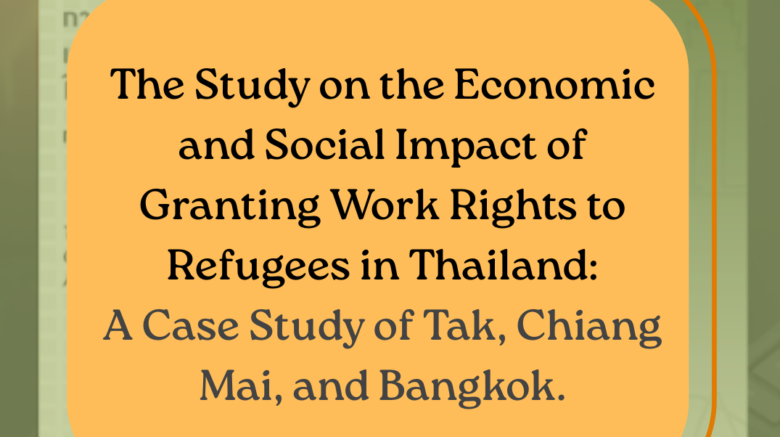The Myanmar Response Network (MRN), in which Asylum Access Thailand participates as a core member, in collaboration with the Center of Excellence in Econometrics (CEE), Faculty of Economics, Chiang Mai University, officially launched the report titled “The Study on the Economic and Social Impact of Granting Work Rights to Refugees in Thailand: A Case Study of Tak, Chiang Mai and Bangkok.”
The report is the result of a collaboration between academic researchers and civil society actors with long-standing experience working alongside refugees. This integration of economic research with grounded insights ensures that the policy recommendations reflect both statistical evidence and the lived experiences of displaced populations. The study advocates for a model of “Refugee Economic Inclusion,” which recognizes refugees as active economic contributors and proposes mechanisms to include them fairly and responsibly in the Thai economy.
The report provides detailed analysis of both economic and social impacts of refugee work rights including effects on household income, local consumption, market access, and social cohesion. Field data was collected through surveys, interviews, and focus groups in the three key areas of Tak, Chiang Mai, and Bangkok, all of which host significant numbers of Myanmar refugees.
The concept of “Refugee Economic Inclusion” is not only an economic proposal but a rights-based approach that envisions refugees living in dignity under clear legal frameworks with support from state institutions, the private sector, and civil society. The study finds that enabling refugees to work legally contributes to local economic activity, enhances tax and social protection systems, and supports long-term community development.
Myanmar migrant workers, many of whom have long filled labor shortages in agriculture, manufacturing, and services sectors are described as “foundational labor” that underpins Thailand’s economy. Their contributions help maintain price stability and business continuity during times of labor scarcity especially in small and medium-sized enterprises and rural industries. Formalizing these contributions through legal inclusion would also expand government revenue and strengthen public services.
The report also calls for urgent implementation of conditional inclusion policies that both protect refugee rights and mitigate impacts on Thai workers. This includes investments in upskilling Thai labor, improving labor market productivity, and transitioning from a cost-based to a productivity-driven labor model. Doing so will allow Thailand to remain competitive while promoting shared prosperity.

